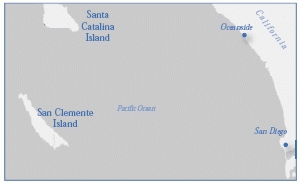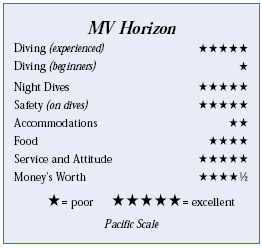MV Horizon, San Diego, CaliforniaContents of this Issue: Diver Rescued after 56 Hours at Sea. Or So He Claimed? Latest Results on Insect Repellents MV Horizon, San Diego, California Decompression Illness Presenting as Breast Pain Crikey! Irwin's Death Stirs Backlash Stingray City Tours Continue Despite Irwin's Death Do Life Insurers Discriminate Against Divers? Nai'a Crew Rescues All Hands After Grounding Scubapro Recalls Dangerous MK20 First Stages . . . Finally Editorial Office: Ben Davison Publisher and Editor Undercurrent 3020 Bridgeway, Suite 102 Sausalito, CA 94965 kelp forests and sea lions from the October, 2006 issue of Undercurrent
In his classic Tale of Two Cities, Charles Dickens wrote “it was the best of times, it was the worst of times.” For this diver, he described my August trip aboard the Horizon. The worst? Being seasick for two of five dive days, the first time that’s ever happened to me, and it’s worse when you’re sharing just two bathrooms with 20 divers and 9 staff members. The water was 55-65 degrees, and my insulation lacked a layer. My camera and dive computer crapped out. Tiny, dimly lit cabins with bunk beds. (Some beds are just curtained berths, as in a railroad car.) And bad weather that kept us away from San Nicholas Island and Begg Rock. The best? How about those kelp forests 50 feet high, playing tag with sea lions, finning among friendly rays and fish? Five dives a day. Great meals. A hardworking boat crew that treated everyone as responsible divers and they kept the heads clean, too. Those best of times outweighed the worst. On a balmy, 75-degree night, I boarded the 80-foot, three-deck Horizon in San Diego Bay at 9:00 p.m. I dropped our gear on the main deck and headed to my small, well-ventilated but dimly lit aft cabin, with two double bunk beds, a three-drawer chest, four hooks and a 110-volt electrical outlet. Other divers hunkered down in curtained dorm-style bunks or cabins with single and double bunk beds. Cabins had no toilets, so everyone on board shared two showers and two heads topside. Dickens would have had much to say about this. We departed at 11:00 p.m., gentle waves lulling me to sleep. By 2:00 a.m., those gentle waves had morphed into hard slappers that bounced me from bulkhead to bulkhead. Too groggy for the 6:00 a.m. continental breakfast, I arrived for the 7:00 a.m. buffet (eggs, bacon, sausage, country potatoes, pancakes). Alas, the motion limited me to three bites. I swallowed a Meclizine™ and concentrated on Captain Chris’s briefing of the Inside Boiler site off San Clemente Island. The Horizon crew treated divers like adults. “You are responsible for your own dive planning, dive profiles, lost buddy plan, safety stops and coming up with no less than 500 PSI,” announced Chris. The Horizon lacks dive-deck seating and underneath gear storage. Suits hang in one area, tanks are secured in another. Fins, masks, weight belts, etc., are stowed elsewhere. Divemasters Mike and Anita and two crew members helped anyone needing help retrieving equipment or gearing up (there were a few tech divers). They didn’t dive with us but remained on the deck to monitor bubbles and pilot inflatable skiffs if a diver needed recovery.
After a second dive, they laid out a BBQ lunch while we motored to Twin Peaks for a third and similar dive. Here, the water dropped to a cold 55 degrees. Some divers in 7-ml Farmer John wetsuits got iced, but I did too –- even in my drysuit I needed more layers. On to China Hat, for pre-dinner and night dives, which I skipped to get my heat back. But my buddy, a techie, told me that his light had sent lobsters bouncing around like balls in a pinball machine. He found a brown sea hare the size of a turkey and a basketball-sized crab. While he dived, I thumbed Horizon’s stash of action paperbacks and men’s magazines, while others watched dive videos or donned light jackets to enjoy the night’s 65-degree on-deck breezes. Those breezes helped to dry gear that we hung on-deck secured with bungee cords. Staff offered to hang drysuits and wetsuits in the engine room overnight. Given accommodations that only a Dickens character would have found luxurious, one might expect cuisine to match, but Chef Corey soared in his cluttered galley, open to the passengers’ view. You could lean over the bar, observe and discuss every chop, mix and bake. Buffet lunches started with Caesar or seafood salads, then core-warming bowls of Potage St. Germaine, thick pea soup flavored with sherry, or shellfish-rich cioppino that even a San Francisco fisherman would envy. There was even a BBQ buffet. Seated dinners began with hors d’ouevres such as minutes-fresh sushi or brie baked in puff pastry. Corey grilled fish or steaks on deck or roasted prime rib, surrounding them with fresh veggies and fresh salads. Pies, cakes or ice creams sometimes prevailed over night diving. Fruit, candies, nuts, cookies, tea, coffee and sodas were available all day. The next day, we descended San Clemente’s Arch to a bus-sized swimthrough 99 feet down, then up to fish action on a seamount at 60 feet. After a second dive here, it was lunch and a steam to Window Pane for dives three and four. Here, depths seldom greater than 35 feet made for easy photography and long-lasting air. A bait ball of Pacific mackerel, sardines and anchovies schooled over and around us. Night dives at Four Caves produced more lobsters, horn sharks and bat rays. At Santa Barbara Island’s East Rookery the following day, sea lions eyed me from the surface and juveniles playfully buzzed me. The murky 55-degree water stiffened shutter fingers, and surge occasionally flung photographers across sea urchin-encrusted outcroppings. It was not easy shooting the darting animals. Sutil Island’s 52-degree water shortened the time for wetsuit divers. Afterwards, I savored the on-deck hot shower. Captain Chris joined our dives at Arch Point. Freediving, he speared a yellowtail and Chef Corey served sushi for the evening’s hors d’ouevres. The last night dive punctuated the trip: sea lions catching and eating flying fish, some of which slammed into the boat; moray eels; octopi; a buried 6-foot-long sand shark, invisible except for its cat-like green eyes reflected in dive lights; huge lobsters and baseball-glove-sized Garibaldi sharing a den; four angel sharks and two bat rays, including one missing its tail, perhaps lopped off by an ignorant fisherman before he threw the unwanted fish back into the water. Bad weather forced us away from San Nicholas and Begg Rock to more tolerable Catalina Island for the final day, a two-tanker at Farnsworth Bank. Great viz gave me a glimpse of white sand 100 feet down. I cruised the purple hydrocoral-covered reef about 60 feet, finding well-camouflaged sculpin, Spanish shawl nudibranchs, Garibaldi, sheepshead, giant keyhole limpets, sea hares, anemones and lavender, red and pink gorgonians. During the post-lunch seven-hour trek back to San Diego, I dried things in the on-deck dryer or in the engine room and chatted with fellow divers on the top deck. We were a mixed lot, my instructor techie buddies, a videographer 60-plus years old, and the least experienced, a 24-year-old lady with fewer than 50 dives. Most were from California or the East Coast, and many had done this or another Horizon trip before. As divers always do, we chattered about the great fish life, laughed at an occasional miscue, and seemed to forget that we had to share toilets and showers. It was the best of times. -- N.M.
|

I want to get all the stories! Tell me how I can become an Undercurrent Online Member and get online access to all the articles of Undercurrent as well as thousands of first hand reports on dive operations world-wide
| Home | Online Members Area | My Account |
Login
|
Join
|
| Travel Index |
Dive Resort & Liveaboard Reviews
|
Featured Reports
|
Recent
Issues
|
Back Issues
|
|
Dive Gear
Index
|
Health/Safety Index
|
Environment & Misc.
Index
|
Seasonal Planner
|
Blogs
|
Free Articles
|
Book Picks
|
News
|
|
Special Offers
|
RSS
|
FAQ
|
About Us
|
Contact Us
|
Links
|
3020 Bridgeway, Ste 102, Sausalito, Ca 94965
All rights reserved.

 After logging out by name and
tank number, I dropped into 65-degree
water, then descended the anchor line
in a slight current. Quite a sight!
Orange, green and brown kelp soared 50
feet over coral outcroppings and eel
grass. Skillet-sized orange Garibaldi
exhibited a California laid-back attitude
toward divers; here were a school
of yellowtail, a barracuda, lingcod,
blue rockfish, walleye surf perch,
sheepshead and opaleye rocking in the
surge. Even a Spanish shawl nudibranch.
I avoided hundreds of sea urchins and headed down the wall. Bigeye
turbot lay nearly invisible on the bottom.
Looking up into 60-foot viz, I marveled at
the sun filtering through kelp fronds and
watched a bat ray slip through. However,
while I ogled, a surprise upwelling zoomed
me 20 feet up, then pulled me back down in
less than five seconds. That snapped me
out of my Dickensian fog.
After logging out by name and
tank number, I dropped into 65-degree
water, then descended the anchor line
in a slight current. Quite a sight!
Orange, green and brown kelp soared 50
feet over coral outcroppings and eel
grass. Skillet-sized orange Garibaldi
exhibited a California laid-back attitude
toward divers; here were a school
of yellowtail, a barracuda, lingcod,
blue rockfish, walleye surf perch,
sheepshead and opaleye rocking in the
surge. Even a Spanish shawl nudibranch.
I avoided hundreds of sea urchins and headed down the wall. Bigeye
turbot lay nearly invisible on the bottom.
Looking up into 60-foot viz, I marveled at
the sun filtering through kelp fronds and
watched a bat ray slip through. However,
while I ogled, a surprise upwelling zoomed
me 20 feet up, then pulled me back down in
less than five seconds. That snapped me
out of my Dickensian fog. To surface, I edged up the anchor
line, keeping control in the surge, then
kicked to the two ladders astern. Wide,
open steps meant I could climb up with my
fins. The crew hauled up tanks and weights,
removed fins if needed (a boon to mature
divers) and checked us in by name and tank
number.
To surface, I edged up the anchor
line, keeping control in the surge, then
kicked to the two ladders astern. Wide,
open steps meant I could climb up with my
fins. The crew hauled up tanks and weights,
removed fins if needed (a boon to mature
divers) and checked us in by name and tank
number. Divers Compass: MV Horizon docks at H & M Landing at the end of
Emerson Street, 15 minutes from San Diego International Airport.
Park at the landing ($5 per day) or take a cab ($15 from airport)
. . . Small cabins ($880/person, double occupancy) or curtained
dorm-style bunks ($820). Price includes meals, snacks,
non-alcoholic drinks except frappuccinos and smoothies, domestic
beer and house wine. Imported beer and upgraded wine for purchase.
Or bring your own. One beer or glass of wine with lunch,
dinner or cocktail hour, and you’re done diving for the day . . .
Except for queues before breakfast and dinner, the two toilets and showers were
usually accessible, always clean and never ran out of hot water . . . Bring your
own towels, tanks and weights or use theirs (aluminum 80s, 3000 PSI fills); same
price. 32% Nitrox $6 per fill, fifth fill free. On main deck: three wide shelves
for cameras, separate rinse tank, many outlets for chargers . . . Brochure claims
31 individual bunks but 20-odd divers and 9 staff made for a tight fit . . . Fore
cabins get more ocean motion than those aft . . . Nearest recompression chambers
on Catalina Island and San Diego . . . Horizon carries VHF and single side-band
radios, radar, GPS, sat emergency locator, weather info receiver, sat phone and
weather fax . . . Although some dived 5 mm with vest or 7 mm wet, many divers used
drysuits; novices may find the cold water, upwellings and surge intimidating . . .
remember your motion-sickness remedies . . .
Divers Compass: MV Horizon docks at H & M Landing at the end of
Emerson Street, 15 minutes from San Diego International Airport.
Park at the landing ($5 per day) or take a cab ($15 from airport)
. . . Small cabins ($880/person, double occupancy) or curtained
dorm-style bunks ($820). Price includes meals, snacks,
non-alcoholic drinks except frappuccinos and smoothies, domestic
beer and house wine. Imported beer and upgraded wine for purchase.
Or bring your own. One beer or glass of wine with lunch,
dinner or cocktail hour, and you’re done diving for the day . . .
Except for queues before breakfast and dinner, the two toilets and showers were
usually accessible, always clean and never ran out of hot water . . . Bring your
own towels, tanks and weights or use theirs (aluminum 80s, 3000 PSI fills); same
price. 32% Nitrox $6 per fill, fifth fill free. On main deck: three wide shelves
for cameras, separate rinse tank, many outlets for chargers . . . Brochure claims
31 individual bunks but 20-odd divers and 9 staff made for a tight fit . . . Fore
cabins get more ocean motion than those aft . . . Nearest recompression chambers
on Catalina Island and San Diego . . . Horizon carries VHF and single side-band
radios, radar, GPS, sat emergency locator, weather info receiver, sat phone and
weather fax . . . Although some dived 5 mm with vest or 7 mm wet, many divers used
drysuits; novices may find the cold water, upwellings and surge intimidating . . .
remember your motion-sickness remedies . . . 